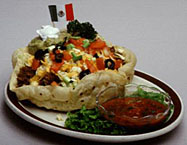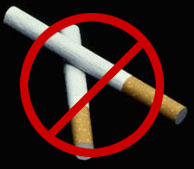
Prepared by
Beth Reames, PhD, LDN, RD,

Diane Linder, EdD, LDN, RD
and

Donna Montgomery, MS
Page 2 of 4
Nutrients should come from food.
Vitamin tablets should not be taken unless the doctor recommends
them.
|
|
Foods for
Two - Baby and You!
 Before birth, a baby is totally
dependent on the mother to get the nutrients needed for growth
and health. A baby lives on the nutrients from foods the mother
eats and drinks during pregnancy. Nutrients are very small individual
parts of foods that our bodies need to live. These nutrients
should come from food. Vitamin tablets should not be taken unless
the doctor recommends them. Nutrients include: Before birth, a baby is totally
dependent on the mother to get the nutrients needed for growth
and health. A baby lives on the nutrients from foods the mother
eats and drinks during pregnancy. Nutrients are very small individual
parts of foods that our bodies need to live. These nutrients
should come from food. Vitamin tablets should not be taken unless
the doctor recommends them. Nutrients include:
- Protein - for building and repair
- Fat - for energy
- Carbohydrate - for energy
- Vitamins - to help protein, fat and carbohydrate do
their jobs
- Minerals - for body structure and to help the other
nutrients do their jobs
Eating the right types and amounts of foods during pregnancy
helps a woman gain the amount of weight recommended by the doctor.
The foods needed during pregnancy are the same ones needed by
non-pregnant women. A pregnant woman just needs more servings
from the food groups to provide extra calories, protein, vitamins
and minerals. Variety and balance are the important ideas for
a healthy pregnancy food plan. Choose foods from the Food Guide
Pyramid during pregnancy, including:
Milk, Cheese
and Yogurt Group - Three Servings
 This group is important because
it provides protein for growth and repair, and calcium for strong
bones and teeth. Pregnant women need three servings each day. This group is important because
it provides protein for growth and repair, and calcium for strong
bones and teeth. Pregnant women need three servings each day.
A serving from this group is one cup of milk or yogurt, one
and one-half ounces natural cheddar cheese, or two ounces processed
cheese.  Choose skim or low-fat milk if
you need to cut down on fat. (Note: If drinking milk causes gas
or diarrhea, low-lactose milk (such as Lact-Aid) can be substituted.
Also try cheese, yogurt, soybean milk or other foods such as
greens, broccoli, canned fish, almonds and tofu to get calcium. Choose skim or low-fat milk if
you need to cut down on fat. (Note: If drinking milk causes gas
or diarrhea, low-lactose milk (such as Lact-Aid) can be substituted.
Also try cheese, yogurt, soybean milk or other foods such as
greens, broccoli, canned fish, almonds and tofu to get calcium.
Meat, Poultry,
Fish, Dried Beans, Eggs and Nuts Group - Two to Three Servings
 This group provides protein that
helps build body tissues for you and your baby. This group also
has iron needed for building red blood cells. During pregnancy,
you need two to three servings per day. This group provides protein that
helps build body tissues for you and your baby. This group also
has iron needed for building red blood cells. During pregnancy,
you need two to three servings per day.
A serving from this group is two to three ounces of cooked
lean meat, poultry or fish (about the size of the palm of your
hand), one cup cooked dried beans or peas, two eggs and four
tablespoons peanut butter. Try baked, broiled or stewed meats
instead of frying them. This helps cut down on fat and problems
like heartburn.
Vegetable
Group - Three to Five Servings
 This group provides vitamins and
minerals that help body cells work properly. Two vitamins, vitamin
A and folic acid, may be lacking in many pregnant women's diets.
Vegetables are good sources of these two vitamins. Vegetables
also give you fiber or roughage to keep you from being constipated.
You should try to eat three to five servings of vegetables every
day. This group provides vitamins and
minerals that help body cells work properly. Two vitamins, vitamin
A and folic acid, may be lacking in many pregnant women's diets.
Vegetables are good sources of these two vitamins. Vegetables
also give you fiber or roughage to keep you from being constipated.
You should try to eat three to five servings of vegetables every
day.
A serving is a half cup cooked or chopped raw vegetables or
one cup leafy raw vegetables. Try vegetables raw with dip, as
a snack, as a salad, cooked with a meal or mixed into your favorite
casserole.
Fruit Group
- Two to Four Servings
 Fruits provide vitamins, minerals
and dietary fiber or roughage, too. An important vitamin in this
group is vitamin C, which may be lacking in pregnant women's
diets. Try to eat two to four servings of fruits every day. Fruits provide vitamins, minerals
and dietary fiber or roughage, too. An important vitamin in this
group is vitamin C, which may be lacking in pregnant women's
diets. Try to eat two to four servings of fruits every day.
A serving is one medium piece of raw fruit, a half cup fresh
or canned fruit or a half cup fruit juice. Eat fruits fresh,
dried or canned in their own juices. Fruits taste good as a snack
or for dessert.
Breads, Cereals,
Rice and Pasta Group - Nine to 11 Servings
This group provides carbohydrate for energy as well as vitamins,
minerals and fiber. Try to eat nine to 11 servings from this
group daily.
A serving is one slice bread, a half to three-fourths cup
cooked cereal, rice or pasta, and one ounce ready-to-eat cereal.
Many people think this amount of breads and cereals will make
them fat. These foods are not fattening; it's what we put on
them (butter, margarine or gravy) that adds extra calories. If
you're overweight, you still need nine servings from this group.
Try whole-wheat breads or muffins for a change. Eat rice with
beans. Carry crackers, graham crackers or dry cereal as a snack.
Try oatmeal and other cooked cereals.
Some nutrients
that may be lacking in a pregnant woman's diet include:
- Protein - building material for muscle and tissue
for baby and mother
- Calcium - helps form baby's bones and teeth and maintains
mother's bones
- Iron - builds red blood cells for healthy blood supply
- Folic acid -necessary for growth and development of
new cells, especially red blood cells and, during prenatal development
that occurs in the early weeks of pregnancy, in the formation
of the baby or fetus's neural tube which becomes the spine.
Food rich
in these nutrients include:
- Protein - dairy foods (milk, cheese and yogurt), lean
meats, poultry, fish, dried beans, eggs and nuts.
- Calcium - milk, yogurt, cheese, other dairy products,
broccoli, kale, green leafy vegetables, clams, oysters, fish
with bones, almonds, dried peas and beans and calcium-fortified
foods.
- Iron - meat, liver, poultry, fish, oysters, enriched
breads and cereals, green leafy vegetables, dried beans and peas,
dried fruit, broccoli, kale and collard and other dark leafy
greens.
- Folic Acid - liver, eggs, broccoli, kale, collard
greens, yeast, dried peas and beans, oranges, whole-grain breads
and cereals, fruits and vegetables.
Take this quiz on the web to test your folate knowledge: www.babycenter.com/calculator/4203.html
Women, Infant and Children (WIC) is a special program that
provides nutritious foods to eligible pregnant and breastfeeding
mothers. These foods include milk, juice, cereals, eggs,
cheese and peanut butter. Information about WIC is available
through the Cooperative Extension Service, the local health unit
or the doctor's office.
Smoking,
Drinking and Doing Drugs Can Hurt Your Baby!
 Everything a pregnant woman consumes
- food, drugs, over-the-counter-drugs, tobacco and alcohol -
travels from the mother's bloodstream through the "pipe"
or placenta to the baby. Pregnant women who abuse substances
can cause many problems including infant death, mental retardation,
deformities and low- birth-weight. Low-birth-weight is dangerous.
Those babies have a greater chance of dying before they are one
year of age. Low-birth-weight infants have greater problems as
children and adults. They have problems in school. They have
more behavioral, emotional and psychological problems. They have
more illnesses. There is more of a financial strain on the family. Everything a pregnant woman consumes
- food, drugs, over-the-counter-drugs, tobacco and alcohol -
travels from the mother's bloodstream through the "pipe"
or placenta to the baby. Pregnant women who abuse substances
can cause many problems including infant death, mental retardation,
deformities and low- birth-weight. Low-birth-weight is dangerous.
Those babies have a greater chance of dying before they are one
year of age. Low-birth-weight infants have greater problems as
children and adults. They have problems in school. They have
more behavioral, emotional and psychological problems. They have
more illnesses. There is more of a financial strain on the family.
Substance abusers also have a higher risk of problems during
pregnancy such as miscarriage, premature labor or sudden bleeding.
If you drink alcohol, your baby could be mentally retarded, deformed
or have Fetal Alcohol Syndrome (FAS). This causes mental retardation,
behavior and learning problems, heart and organ defects and deformed
facial features.
Drugs, like pot, heroin, cocaine and crack, can damage your
baby's organs, causing death, deformities and mental retardation.
Some babies whose mothers take drugs are born with drug addictions
themselves. These babies have severe health problems.
Even medicines and drugs like aspirin, laxatives and baking
soda can cause problems for your baby. Don't take any drugs or
medicines unless your doctor tells you to.
Taking drugs any time during pregnancy is dangerous. But the
first three months of pregnancy are especially critical because
this is when your baby's organs are being formed. Most women
don't even know they're pregnant during the first four to six
weeks. This is why it is important for all women of childbearing
age to avoid drugs!
To help you quit smoking, drinking or doing drugs:
- Write down reasons why you want to stop or should stop.
- Ask a friend to help you.
- Throw away cigarettes, matches, ashtrays, alcohol or drugs.
- Go for help or counseling. Ask your doctor or health care
provider for assistance.
- Stay away from places or activities that cause you to smoke,
drink or take drugs.
It's never too late in a pregnancy to change! There
are several groups that can help a woman to stop abusing substances:
- Alcoholics Anonymous
Narcotics Anonymous
Substance Abuse Treatment
Programs
Stop-smoking clinics
Health care professionals
   [ LESSONS || SITE
MAP || LOCAL AGENTS || RESOURCES || PEOPLE ]
[ LESSONS || SITE
MAP || LOCAL AGENTS || RESOURCES || PEOPLE ]
 Issued in furtherance of Cooperative Extension
work, Acts of Congress of May 8 and June 30, 1914, in cooperation
with the United States Department of Agriculture. The Louisiana
Cooperative Extension Service provides equal opportunities in
programs and employment. Information and Graphics on this site
are copyright protected by LSU Agricultural Center's Louisiana Cooperative Extension Services.
For more information
on the EFNEP program, contact EFNEPMail@agcenter.lsu.edu. Issued in furtherance of Cooperative Extension
work, Acts of Congress of May 8 and June 30, 1914, in cooperation
with the United States Department of Agriculture. The Louisiana
Cooperative Extension Service provides equal opportunities in
programs and employment. Information and Graphics on this site
are copyright protected by LSU Agricultural Center's Louisiana Cooperative Extension Services.
For more information
on the EFNEP program, contact EFNEPMail@agcenter.lsu.edu.
|